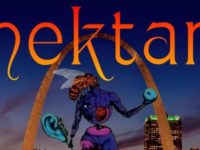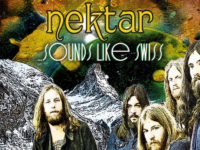Roye Albrighton jump started Nektar again in 2000, after recovering from a near-fatal liver infection, but in some ways the band is just now coming into its own again.
Founded in 1970, these often-overlooked prog-rockers reached their commercial zenith in the early part of that decade, and by 1980 found themselves on extended hiatus. Not until Albrighton was given just weeks to live, then a second chance after a suitable donor was found, did Nektar finally spring back to life.
“I had been through a very serious illness,” Albrighton tells us in this Something Else! Sitdown, “and very nearly didn’t make it. While I was laying there recuperating, I thought to myself that regardless of how long I have to live after this illness I would spend it with my old band and make some more music.”
Still, it took awhile for the stars to align this time around.
Albrighton — who leads Nektar along with fellow original member Ron Howden — showed up as a guest on Cleopatra Records’ 2012 Supertramp tribute Songs of the Century, then issued a guest-laden covers project for the same label called Spoonful of Time. Now, Nektar has completed a new original album for release in early 2013. Nektar will mount a tour of Europe next year, too, but not before appearing as part of the Cruise to the Edge at-sea concert event in March.
We caught up with the busy Albrighton to talk about Nektar’s upcoming release, the Spoonful of Time sessions, and highlights from those classic 1970s albums …
NICK DERISO: Nektar, it seems, is on a roll. What can fans expect from the forthcoming project? Will there be an overriding theme for the album?
ROYE ALBRIGHTON: The new studio album, called Time Machine, is not really centered around any particular theme. It covers a lot of situations that we might find ourselves in at any particular time in our lives. Our fans know that each album that Nektar releases is different from the one before. We are lucky to be in that situation.
NICK DERISO: Who will be joining you this time in the studio?
ROYE ALBRIGHTON: Joining us on this venture will be Klaus Henatsch, a wizard keyboardist who as been with the band for the last five or so years. Handling the bass will be Billy Sherwood.
NICK DERISO: While most prog-rock bands explored European musical traditions to the exclusion of all else, Nektar remains one of the few to employ these deep blues riffs as part of your signature sound. How did these rootsy elements enter your musical vocabulary? Did you have a favorite figure who provided a main influence?
ROYE ALBRIGHTON: The original band, comprised of Ron Howden, Alan Freeman, Derek Moore and myself, are all Brits from the middle and north of England. Many musicians of our age played in blues clubs the length and breadth of the UK in the 1960s, up until we found each other in Hamburg, Germany. Many of the musicians that I listened to in those early years were the American blues greats like Muddy and Lowell Fulson and of course B.B., but was never really attracted by the Clapton-esque style of playing — which was single note soloing. I was more into the chordal type of playing and soloing.
NICK DERISO: Take us into the planning stages for your new guest-star packed covers project for Cleopatra. How did that come about?
ROYE ALBRIGHTON: I got a call one day from John Lappen Enterprises, asking on behalf of Cleopatra Records if any of Nektar’s back catalog was available for release by them. This led to me also doing a vocal for them on the Supertramp tribute album, a track called “Rudy.” After this came the request that Nektar do a covers album, with various artists assisting. As Cleopatra had many contacts to these artists, it was a done deal and Cleopatra picked the songs to be recorded.
NICK DERISO: Obviously, those songs are deeply familiar to fans and musicians alike. Did working with people like Rick Wakeman, Edgar Froese and Steve Howe spark new musical ideas? Was there a favorite moment?
ROYE ALBRIGHTON: I really did enjoy playing and singing the Neil Young song “Old Man.” But, to be honest we were never in the same studio together. All of the tracks were sent to the different musicians, and all of it was done via the internet — which was a first for me. I’m old school. I like to be in the same room when this is being recorded, but logistics didn’t allow for that.
NICK DERISO: Early on, Nektar boasted this volcanic overlay of psychedelia, best heard on 1971’s Journey to the Centre of the Eye. The interesting part, to me, about that project was that you explored the idea of our body, when it seemed everyone else was off into outer space.
ROYE ALBRIGHTON: When we finally found a place to lay our hats in Germany, we set about deciding which direction we wanted to go, music-wise. We all had zillions of ideas that were bursting to come out collected over our own personal years of clubbing. Eventually, we just let it come out at its own pace and Journey was part of what transpired from those sessions in our little practice room in the cellar of our rented house in the Odenwald forest. What was then obvious was that it all sounded a little trippy and, if you like, spacey. So we decided to sit down and devise a story line encompassing the sounds we had created, and a theme that had never been used before. The idea of outer space intrigued us but we wanted a different take on it, so we thought about inner space and seeing the world through different eyes.
NICK DERISO: Nektar was also out in front on an issue that has gotten a lot more traction in recent years, when you dealt with the various threats to our environment on 1976’s Recycled. What led you to ask Beatles engineer Geoff Emerick for a remaster of that project? The results were like hearing those songs for the very first time.
ROYE ALBRIGHTON: We were not really happy with the first mix — and that is why we decided to ask Geoff to take it under his wing and see what he came up with. As for the theme, Nektar’s very first tour of the USA was quite extensive and hectic. It was, for us, a complete eye opener. After the first week of touring, we were astonished at the throw-away society that the US was accustomed to. We already had most of Recycled written by that time, but under a different title. It was this shock to the system that decided the route that the new album should take. Little did we know that in the future it would become such a hot worldwide topic.
NICK DERISO: 1973’s Remember the Future had a space-theme and album side-length compositions, but also this underlying groove that seemed to have more in common with the funk music of the day than, say, Yes’ Tales from Topographic Oceans. Nearly four decades later, do you feel that’s something that puts Nektar in a class by itself?
ROYE ALBRIGHTON: I think that as long as Nektar exists, we will always be expected to play something from that album. It was a very good album, and one that I really enjoyed making along with the other guys in the band. Yes, I believe that that album put Nektar in a class of its own, away from the Genesis/Yes/Gentle Giant School.
NICK DERISO: Can fan expect similar grooves on Time Machine?
ROYE ALBRIGHTON: There are all kind of grooves on the new album!
NICK DERISO: 1974’s circus-themed Down to Earth, meanwhile, didn’t get much credit in the rock press at the time, but there is so much musical invention to be found there. In particular, I loved “Early Morning Clown,” with its trippy Leslie speaker rotations. That, too, seems like another instance where Nektar doesn’t get its due as innovators.
ROYE ALBRIGHTON: To be honest, we don’t. Whether or not it was to do with the fact that we were never in with the London crowd, and lived in another country, I don’t really know or care. The fact that there are people out there that enjoy what we do is a bonus for us. We have no illusions of grandeur about becoming mega-stars with our style of music — so we do what we do, for as long as we can.
- How Deep Cuts on ‘Music From Big Pink’ Underscore the Band’s Triumph - July 31, 2023
- How ‘Islands’ Signaled the Sad End of the Band’s Five-Man Edition - March 15, 2022
- The Band’s ‘Christmas Must Be Tonight’ Remains an Unjustly Overlooked Holiday Classic - December 25, 2016




